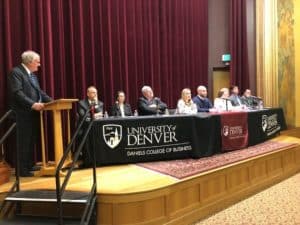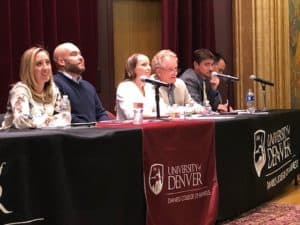 Drawing more than 90 students and other individuals, Daniels’ Department of Business Ethics and Legal Studies held the panel discussion, “The Supreme Court after Kennedy,” in Margery Reed’s Reiman Theater Oct. 23.
Drawing more than 90 students and other individuals, Daniels’ Department of Business Ethics and Legal Studies held the panel discussion, “The Supreme Court after Kennedy,” in Margery Reed’s Reiman Theater Oct. 23.
The panelists, all BELS faculty members, discussed cases in which newly-retired U.S. Supreme Court Justice Anthony Kennedy played an important role, and suggested similar or different positions that recently-appointed U.S. Supreme Court Associate Justice Brett Kavanaugh might take in the future.
Associate Professor Corey Ciocchetti addressed four cases where Justice Kennedy advanced gay rights over recent years. Ciocchetti opined that though Kennedy’s doctrinal interpretations might be subject to challenge by future Courts, they would remain precedents far into the future. Assistant Professor Bruce Klaw discussed political speech cases, including the controversial Citizens United v. FEC, and a case granting union members the right to not have their dues used for political purposes. He explained how Justice Kennedy, writing for the Supreme Court, expanded the ability of donors to spend unlimited sums on political races. Klaw expects Justice Kavanaugh to follow that precedent and oppose future spending limits.
Professor Don Mayer explained the doctrines of standing and judicial deference, especially as the latter has applied to agency decisions on environmental regulations. Justice Kennedy stood with a 5-4 majority granting the states standing to challenge inaction by the EPA in a climate control case. While Justice Kennedy did not oppose judicial deference to agency decisions, both Justices Gorsuch and Kavanaugh have opposed it in their writings, suggesting it might be abandoned by the new Supreme Court. That could lead the Court to be more activist in overturning agency decisions. Associate Professor Tricia Olsen discussed a recent human rights case, where Justice Kennedy wrote the majority opinion in denying foreign nationals the right to sue foreign corporations under the Alien Tort Statute. Justice Kavanaugh would likely take a similar position. Assistant Teaching Professor Albert Kovacs then commented on the tendency of the Court to defer to presidential power in foreign policy, including the recent travel ban, in spite of lower court opposition. Justice Kavanaugh will likely follow in line with that decision, and given his previous writings, will also endorse presidential immunity from prosecution and lawsuits while still holding office. Justice Kennedy also wrote for the Court in extending the right of habeas corpus to foreign detainees who are terrorist suspects, a precedent with which Justice Kavanaugh might disagree but will likely not contest.
 Three other speakers addressed important business-related cases. Associate Teaching Professor Paula Holt examined a recent arbitration case, in which Justice Kennedy was in the majority, and which extended the judicial deference to arbitration clauses, even though they typically favor corporations over the complaints of employees and investors. Adjunct Professor Josiah Hatch then dissected the recent decision of the Supreme Court to overturn precedent and give the states the right to tax internet sales, a major victory for states and for traditional brick-and-mortar stores. It is unclear how Justice Kavanaugh might have voted in such a case that pits states’ rights against internet companies.
Three other speakers addressed important business-related cases. Associate Teaching Professor Paula Holt examined a recent arbitration case, in which Justice Kennedy was in the majority, and which extended the judicial deference to arbitration clauses, even though they typically favor corporations over the complaints of employees and investors. Adjunct Professor Josiah Hatch then dissected the recent decision of the Supreme Court to overturn precedent and give the states the right to tax internet sales, a major victory for states and for traditional brick-and-mortar stores. It is unclear how Justice Kavanaugh might have voted in such a case that pits states’ rights against internet companies.
Assistant Teaching Professor Libbi Levine Segev explained a controversial property rights case that expanded the power of state and local governments to seize private property for public use, by allowing them to use that power of eminent domain to seize private homes to build upscale commercial developments. Libertarians and some state legislatures have resisted the expanded definition of “public use.” Associate Professor Kevin O’Brien then examined two recent privacy cases, in which the Supreme Court has restricted the use of warrantless searches to either access digital data or to ascertain cell phone location data. On these cases of law enforcement v. privacy interests, Justice Kavanaugh has yet to tip his hand.
Moderator and Professor John Holcomb wrapped up the panelists’ comments by examining the evolution of Justice Kennedy’s positions on affirmative action. While Kennedy earlier did not embrace a race-conscious program by the University of Michigan Law School, 13 years later he wrote the majority opinion in a decision that upheld a similar affirmative action program at the University of Texas. It is likely that Justice Kavanaugh would oppose affirmative action and support Kennedy’s earlier position, not his latest.
The panel entertained several questions from the audience, ranging from those on specific cases, to the likelihood of Justice Kavanaugh changing his views and becoming more liberal over time, to the politics surrounding the appointment and confirmation of justices. While the days of affirmative action might be numbered, the panel’s consensus was that both gay rights and abortion rights should survive the presence of Justice Kavanaugh on the Court. The BELS Department looks forward to organizing similar panels on future terms of the Supreme Court.
